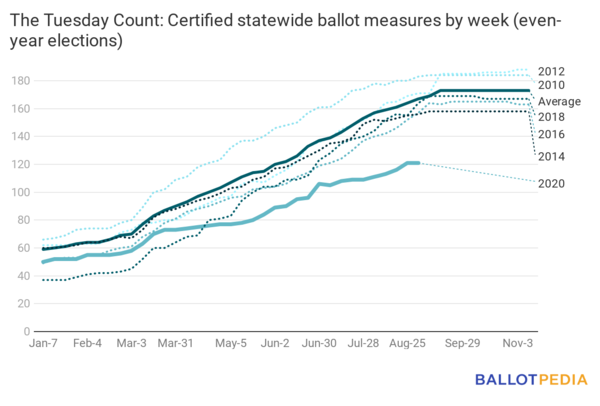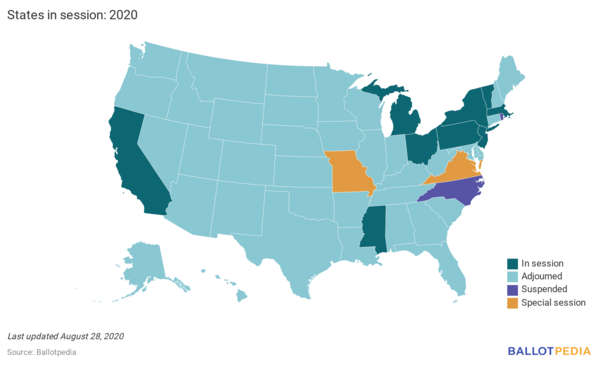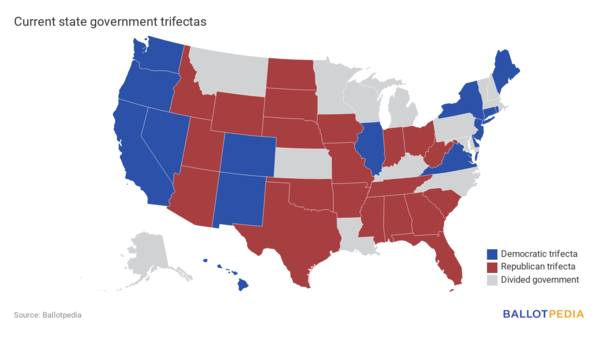The State and Local Tap: Alaska Attorney General Kevin Clarkson (R) resigns
From Ballotpedia
THE WEEK IN REVIEW
State Politics: The Week in Review
Ballot Measures Update
- To date, 121 statewide measures in 34 states have been certified for the 2020 ballot.
- There are no more pending citizen-initiated measures pending signature verification for the election on Nov. 3.
- Forty-three of the certified measures are citizen-initiated measures. Seventy-seven are legislative referrals. One is an automatic constitutional revision commission question.
- Six new measures were certified for the November ballot in Arizona, Colorado, Maine, and Nebraska.
- Arizona Proposition 208—a citizen initiative to increase the tax rate on income about $250,000 to provide funding for teacher salaries and education programs—was certified for the ballot on Aug. 21.
- Colorado Voter Approval of Enterprises Initiative—an initiative designed to require voter approval for new state enterprises projected to receive $100 million from fees and surcharges within five years—was certified on Aug. 24.
- Maine Ranked-Choice Voting for Presidential Elections Referendum—a veto referendum to overturn a law that would adopt ranked-choice voting in presidential primaries and general elections—was certified by a court order on Aug. 24.
- Colorado Paid Medical and Family Leave Initiative—a citizen-initiated statute to establish a payroll tax-financed paid family and medical leave program—was certified on Aug. 25.
- Colorado Allow Voters in Central, Black Hawk, and Cripple Creek Cities to Expand Authorized Games and Increase Maximum Bets Initiative—a citizen-initiated constitutional amendment—was certified on Aug. 27.
- Nebraska Medical Marijuana Initiative—an initiative to legalize medical marijuana—was certified on Aug. 27.
- Three ballot measures were removed from the ballot by a court.
- North Dakota Top-Four Ranked-Choice Voting, Redistricting, and Election Process Changes Initiative was removed from the ballot by the North Dakota Supreme Court on Aug. 25.
- The Arkansas Supreme Court ruled that two ballot initiatives—a measure to create an independent redistricting commission and a measure to adopt ranked-choice voting and other election policies— could not appear on the ballot.
- Eight statewide measures have been on the ballot so far this year. The remaining 113 are on the November ballot.
- The most recent election on a statewide ballot measure was on August 4, when Missouri voters approved Amendment 2, an initiative to expand Medicaid coverage. The vote was 53% to 47%.
Monday, August 24
Florida judge issues injunction against school reopening order
- Florida Second Circuit Court Judge Charles Dodson issued a temporary injunction against Education Commissioner Richard Corcoran’s order requiring schools to open for in-person instruction by the end of August. Dodson said Corcoran's order is “unconstitutional to the extent that it arbitrarily disregards safety, denies local school boards' decision making with respect to reopening brick and mortar schools, and conditions funding on an approved reopening plan with a start date in August.”
- On July 2, Corcoran ordered that all school boards and charter school governing boards must physically open schools for at least five days per week for all students beginning in August. After Hillsborough County Public Schools approved an all-online plan through the start of September, Gov. Ron DeSantis (R) said that the state would withhold aid to the district.
Tuesday, August 25
Eight state legislative primary runoffs held in Oklahoma, three incumbents defeated
- Oklahoma held a statewide primary runoff where candidates competed to advance to the general election in November. A primary was held on June 30. In races where no candidate received a majority of the vote (50% plus one vote), the top two vote-getters advanced to the primary runoff.
- Eight seats in the state legislature were on the primary runoff ballot; five in the Oklahoma State Senate and three in the Oklahoma House of Representatives. All eight races were Republican primary runoffs.
- A total of 24 out of 48 seats in the Oklahoma State Senate are up for election in 2020. Fourteen contested partisan races were on the primary ballot. Districts 5, 7, 17, 35, and 43 advanced to the primary runoff, roughly 36% of contested state Senate primary races. Three of the five state Senate primary runoffs featured incumbents, all of whom were defeated. The remaining two primary runoffs were for open seats.
- All 101 seats in the Oklahoma House of Representatives are up for election in 2020. Thirty-nine contested partisan races were on the primary ballot. Districts 71, 79, and 96 advanced to the primary runoff, roughly 8% of contested state House primary races. No state House primary runoffs featured incumbents in either the primary or the primary runoff.
- Oklahoma has a Republican state government trifecta. A trifecta exists when one political party simultaneously holds the governor’s office and majorities in both state legislative chambers.
Alaska Attorney General Kevin Clarkson (R) resigns
- Alaska Attorney General Kevin Clarkson (R) resigned. His resignation came after ProPublica published an article detailing text messages sent to the personal cell phone of a state employee.
- Deputy Attorney General Ed Sniffen will serve as acting attorney general until the governor appoints a replacement. Attorneys general are subject to the confirmation of the state legislature in Alaska.
Connecticut, New Jersey, and New York update list of states affected by quarantine order
- Govs. Ned Lamont (D-Conn.), Phil Murphy (D-N.J.), and Andrew Cuomo (D-N.Y.) announced on Aug. 25 that travelers from Alaska, Arizona, Delaware, Maryland, and Montana would no longer need to self-quarantine for 14 days upon entering Connecticut, New Jersey, or New York. The territory of Guam was added to the list.
- The total number of states and U.S. territories on the list sat at 30 as of Aug. 28.
Wednesday, August 26
Illinois expands mask requirements in restaurants and bars
- On Aug. 26, Illinois Gov. J.B. Pritzker (D) issued a statewide mask order expanding on the state’s previous restrictions that became effective on May 1. Under the new rule, restaurant and bar patrons are required to wear face coverings anytime they interact with a server, including whenever beverages or food are brought to a table.
- Thirty-four states have statewide orders requiring individuals to wear masks in indoor or outdoor public spaces. All 24 states with a Democratic governor have statewide mask orders, while 10 out of 26 Republican states require face coverings.
- Virginia state Senator Bryce Reeves (R), who represents District 17, announced on Aug. 25 he tested positive for coronavirus.
- California state Senator Brian Jones (R), who represents District 38, announced on Aug. 26 he tested positive for coronavirus.
Thursday, August 27
New Jersey Supreme Court Justice Walter Timpone retires early, Senate confirms Fabiana Pierre-Louis
- Justice Walter Timpone announced that he planned to retire early from the New Jersey Supreme Court if supreme court nominee Fabiana Pierre-Louis was confirmed by the Senate before September.
- The New Jersey Senate voted 39-0 on Aug. 27 to approve Pierre-Louis.
- Pierre-Louis is Governor Phil Murphy’s (D) first nominee to the supreme court.
- The state of New Jersey mandates partisan balance on the court. Because Justice Timpone was nominated as a Democrat, Gov. Murphy had to nominate a Democrat to the court according to state law.
Special Elections
- Fifty-seven state legislative special elections have been scheduled in 26 states so far this year, with 37 seats having taken place already. Heading into those races, Democrats had previously controlled 14 of the seats, while Republicans previously controlled 23. One seat flipped from Democratic control to Republican control, and six seats flipped from Republican control to Democratic control.
- In special elections between 2011 and 2019, one party (either Republicans or Democrats) saw an average net gain of four seats nationally each year.
- An average of 56 seats were filled through special elections in each of the past five even years (2010: 30, 2012: 46, 2014: 40, 2016: 66, 2018: 99).
- An average of 88 seats were filled through special elections in each of the past five odd years (2011: 95, 2013: 84, 2015: 88, 2017: 98, 2019: 77).
- Upcoming special elections include:
Local Politics: The Week in Review
- In 2020, Ballotpedia is providing comprehensive coverage of elections in America's 100 largest cities by population. This encompasses every office on the ballot in these cities, including their municipal elections, trial court elections, school board elections, and local ballot measures. Ballotpedia is also covering all local recall elections as well as all local ballot measures in California.
- 2020
- August 25 - California — Voters in Newman rejected a ballot measure to annex 121 acres. Voters in Tracy approved a ballot measure to annex 180 acres.
- 2020
WHAT'S ON TAP NEXT WEEK
State Politics: What's On Tap Next Week
Tuesday, September 1
Voters to decide state executive, legislative primaries in Massachusetts
- The statewide primary election for Massachusetts is on Sept. 1. Candidates will compete to advance to the November general election.
- A total of 208 seats are up for election, including eight state executive seats and 200 state legislative seats. Candidates are running in elections for the following offices:
- Massachusetts Governor's Council (all eight seats)
- State Senate (all 40 seats)
- State House (all 160 seats)
States in session
Nine states—California, Massachusetts, Michigan, Mississippi, New Jersey, New York, Ohio, Pennsylvania, and Vermont—are in regular session.
About
The Tap covered election news, public policy, and other noteworthy events from February 2016 to February 2022.






